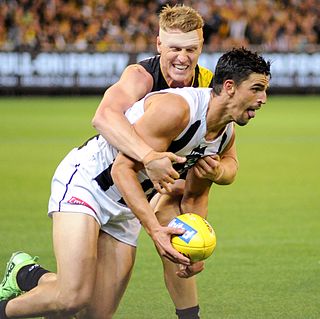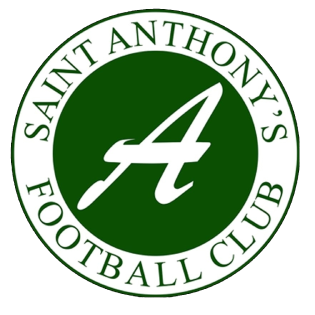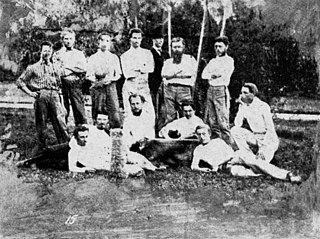
Most forms of football have a move known as a tackle. The primary purposes of tackling are to dispossess an opponent of the ball, to stop the player from gaining ground towards goal or to stop them from carrying out what they intend.

Doncaster Rovers Football Club is a professional association football club based in Doncaster, South Yorkshire, England. The team compete in League Two, the fourth level of the English football league system. The club play their home games at the Eco-Power Stadium, having moved from Belle Vue in 2007. Their home strip consists of red and white hoops, which has been the main design of the club's home shirt since 2001 through different variations.

Forest Green Rovers Football Club is a professional association football club based in Nailsworth, Gloucestershire, England. The team competes in the National League, the fifth level of the English football league system.

Emlyn Walter Hughes was an English footballer. He started his career at Blackpool in 1964 before moving to Liverpool in 1967. He made 665 appearances for Liverpool and captained the side to three league titles and an FA Cup victory in the 1970s. Added to these domestic honours were two European Cups, including Liverpool's first in 1977; and two UEFA Cup titles. Hughes won the Football Writers' Player of the Year in 1977. Hughes completed a full set of English football domestic honours by winning the League Cup with Wolverhampton Wanderers in 1980. In addition to Wolves, he later played for Rotherham United, Hull City, Mansfield Town and Swansea City. Hughes earned 62 caps for the England national team, which he also captained.

Roy of the Rovers is a British comic strip about the life and times of a fictional footballer and later manager named Roy Race, who played for Melchester Rovers. The strip first appeared in the Tiger in 1954, before giving its name to a weekly comic, published by IPC and Fleetway from 1976 until 1995, in which it was the main feature.

The Bradford Bulls are a professional rugby league club in Bradford, West Yorkshire, England, and compete in the Championship, the second tier of British rugby league.
Billy the Fish is a long-running cartoon strip in the British comic Viz that first appeared in 1983. Created by artist Chris Donald and writer Simon Thorp, Billy the Fish is, like many Viz strips, a lampoon of British comics – in Billy the Fish's case, that of football-themed strips such as Roy of the Rovers. The cartoon was adapted into an animated film by Channel 4 in 1990.

St Anthony's Football Club is a Scottish non-league football club based in Glasgow. Nicknamed the Ants, they play in green-and-white hooped kits and currently operate in the West of Scotland League Second Division.

Tiger was a weekly British comics periodical published by Amalgamated Press, Fleetway Publications and IPC Magazines from 11 September 1954 to 30 March 1985. The title was initially launched in a large tabloid size to mimic newspapers; while it featured some action-adventure stories Tiger contained a large number of sport strips. The most famous of these was "Roy of the Rovers", which debuted in the first issue and was the comic's most popular feature, eventually transferring to its own comic in 1975. Tiger would go on to become one of the company's longest-running titles, with 1,573 issues published before being merged with Eagle in 1985. Over the course of its run, Tiger featured columns by numerous famous sports figures, including Ian Botham, Geoff Boycott, Tony Greig, Trevor Francis and Charlie Nicholas.

The Dewsbury Rams are a professional rugby league club based in Dewsbury, West Yorkshire, England that compete in the RFL Championship, the second tier of British rugby league.

The Rochdale Hornets are a professional rugby league club from Rochdale, Greater Manchester, England, competing in the League 1, the third tier of European rugby league. The Rochdale Hornets are one of the original twenty-two rugby clubs that formed the Northern Rugby Football Union in 1895, making them one of the world's first rugby league clubs. Their main local rivals are Oldham, Salford Red Devils, Swinton Lions, Halifax and the Huddersfield Giants.

Brimsdown Rovers F.C. were a football club based in Brimsdown in the London Borough of Enfield, England. They played their home games at the Goldsdown Road stadium, Brimsdown in the London Borough of Enfield. Notable former players include David Beckham & Josh Scowen who both played for the youth team, and Ryan Kirby.

Billy's Boots was a popular British comic strip by writer Fred Baker and artist John Gillatt, later continued by Mike Western. The original Billy's Boots was an earlier humorous series, written and drawn by Frank Purcell, which appeared in Tiger from December 23rd 1961 until July 13th 1963, with a similar premise to this later series. The later more serious Billy appeared in the first issue of Scorcher in 1970, and later moved to Tiger when the two comics merged in 1974. In 1985, Tiger in turn merged with Eagle and the strip moved again. Just a year later, Billy's adventures relocated once more, this time to Roy of the Rovers. New adventures were included in the weekly comic until May 1990, before he switched to Best of Roy of the Rovers Monthly. The strip also appeared in annuals, including annuals for comics which had themselves ceased publication. The strip is still fondly remembered by fans of the "golden age" of British boys' comics. In Finland and Sweden, Billy's Boots was published in Buster magazine. In the UK, stories based on Billy's earliest adventures appeared in Total Football magazine until it closed in 2001, and Billy's story was also reprinted for a few months in the defunct Striker comic.

Craven Park is a rugby league stadium located in Kingston upon Hull, East Riding of Yorkshire, England. It is the home of Hull Kingston Rovers, one of two professional rugby league teams based in the city.

Hot Shot Hamish and Mighty Mouse were two popular British football-themed comic strips, which later merged and appeared in various publications from the 1970s to the 1990s. Both are amongst the best remembered football characters from the "golden age" of British boys' comics.

Johnny Dexter was a fictional footballer who appeared in three different comic strips in the British boys' comic Roy of the Rovers during the 1970s, 80s and 90s. He was a defender, playing centre-back for Danefield United and England and usually left-back for Melchester Rovers. He was amongst the most popular characters in the comic, being the only one other than Roy himself ever to appear on the cover of one of the comic's annuals, and is still fondly remembered by fans of the "golden age" of British sports-themed comics.

Carlisle RLFC were a rugby league team based in Carlisle, Cumbria. The club was called Carlisle Border Raiders for the 1997 season, after which it merged with Barrow Braves.

Nude calendars are a type of wall calendar that feature nude models in a variety of scenes and locations. Predominantly in the United Kingdom, nude calendars are produced to raise money for charity.
Roy of the Rovers comic magazine was launched as a weekly on 25 September 1976, named after the established comic strip of the same name that first appeared as a weekly feature in the Tiger on 11 September 1954. The title ran for 851 issues, until 20 March 1993, and included other football strips and features. In February 1989, the magazine merged with the similarly themed Hot Shot, and was known for a brief time as Roy of the Rovers and Hot Shot, but reverted to its original title shortly afterwards.

The earliest known records of regular soccer games in Brisbane date from the early 1880s, when a group comprising mostly Scottish immigrants commenced playing at Queen's Park, adjacent to Alice and Edward Streets in the city and vacant land in Melbourne Street South Brisbane, between Grey and Stanley Streets. This group of players subsequently formed the Anglo-Queensland Football Association in early 1884, and commenced playing fixtures at the sports field behind the Pineapple Hotel, in Main Street Kangaroo Point, and at Queen's Park, in June 1884.
















